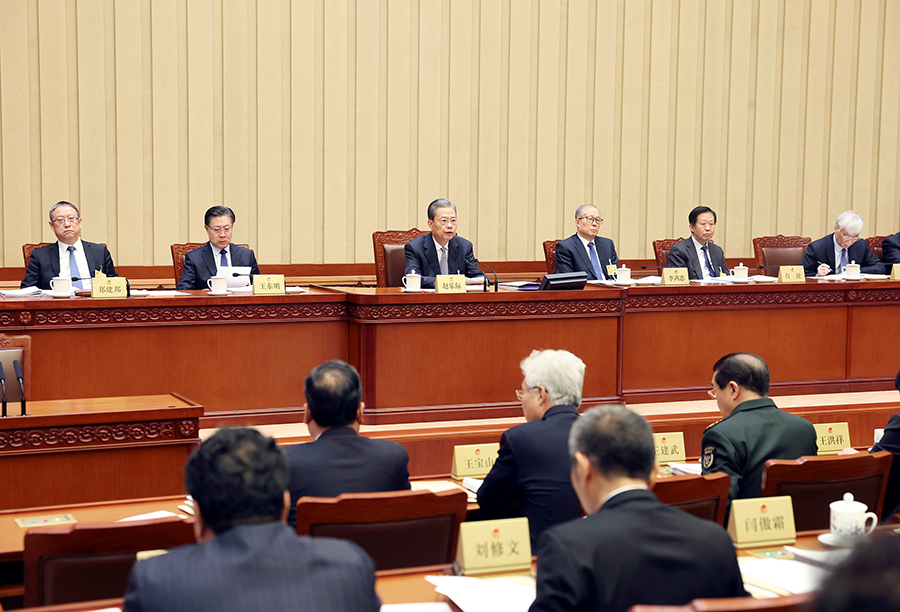Chinese Military Purge Said to Show Corruption, Weakness
March 2024
By Shizuka Kuramitsu
China has purged nine generals from its national legislative body in a sweeping move that analysts say exposes corruption in the senior army ranks and could slow President Xi Jinping’s campaign to modernize the military.
 The Standing Committee of the National People’s Congress, China’s national legislative body, announced on Dec. 29 the dismissal of nine senior military officials of the People’s Liberation Army (PLA). Some of those affected were senior members of the PLA Rocket Force, which is responsible for overseeing the country’s conventional and nuclear land-based missiles.
The Standing Committee of the National People’s Congress, China’s national legislative body, announced on Dec. 29 the dismissal of nine senior military officials of the People’s Liberation Army (PLA). Some of those affected were senior members of the PLA Rocket Force, which is responsible for overseeing the country’s conventional and nuclear land-based missiles.
Beijing did not explain the move, but on Jan. 6, Bloomberg attributed the purge to “widespread corruption [that] undermined [Xi’s] efforts to modernize the armed forces and raised questions about China’s ability to fight a war.”
Citing an unidentified U.S. intelligence source, Bloomberg reported that the corruption scandal involved nuclear missiles that were filled with water instead of fuel and lids for missile silos that do not function properly, thus undermining the effective launch of missiles.
“The corruption inside China’s Rocket Force and throughout the nation’s defense industrial base is so extensive that U.S. officials now believe [that] Xi is less likely to contemplate major military action in the coming years than would otherwise have been the case,” the source told Bloomberg.
On Jan. 15, in its first bulletin of 2024, the Standing Committee explained that the reason for the purge is due to “suspected serious violations of law and discipline,” a commonly used phrase to refer to corruption. Further, the bulletin reported that the ousting of four members, including the former chief of the Equipment Development Department and former commanders of the Rocket Forces, took place Sept. 26 and Dec. 5.
This purge is part of a trend under Xi’s regime. Not even two years after a big reshuffle of high-ranking officials in 2022, China has dismissed even more of them in 2023, including PLA Rocket Force head Li Yuchao in June, Foreign Minister Qin Gang in July, and Defense Minister Li Shangfu in September.
The most recent target is Li Guangchang, a former nuclear fuel director at China National Nuclear Corp., the country’s sole supplier of nuclear fuel. Li is under investigation due to “suspected serious violations of law and discipline,” The South China Morning Post reported on Feb. 4. It said that the Chinese “[C]ommunist Party’s top corruption watchdog says he is undergoing disciplinary inspection and supervision,” but no details have been provided.
In October, the U.S. Defense Department said in its annual China military power report that China had more than 500 operational nuclear warheads in May 2023, compared to 400 warheads in 2022. The department projected that China will possess in excess of 1,000 nuclear warheads by 2030 and will accelerate development of its intercontinental-range ballistic missiles. (See ACT, November 2023.)
If there are flaws with Chinese nuclear missiles as described in the Bloomberg report, “these flaws would compromise missile operations, calling into question China’s nuclear force readiness and overall capabilities,” Jon Wolfsthal, director of global risk at the Federation of American Scientists, wrote in an open letter to U.S. Defense Secretary Lloyd Austin on Jan. 10. Wolfsthal asked if the department was aware of this allegation and whether it would affect the department’s projections.
The department report serves as a basis for U.S. nuclear policies. Because “[t]he growth and reported capabilities of China’s nuclear arsenal are being used increasingly to justify current and potentially additional increases in U.S. nuclear capabilities and spending…the accuracy of [department] documents with regard to China’s nuclear capabilities are central to informing these debates in Congress as well as among security experts and the broader public, and thus, ensuring they are accurate and complete is essential,” Wolfsthal wrote.
But Heather Williams, director of the Project on Nuclear Issues at the Center for Strategic and International Studies, argued that “the recent news questioning the reliability of China’s missiles should not change anything about current U.S. policy.”
In an essay on Jan. 25, she wrote that “the intent of the silos was always unclear, and if anything, Xi has indicated a clear intent to move forward with making them operational and expanding China’s arsenal.”
At the Chinese Communist Party Congress in October 2022, Xi emphasized his determination to build a world-class military with strategic deterrence capability. But “it will take some time for China to clean up the mess and restore confidence in the Rocket Force’s competence and trustworthiness,” Yun Sun, director of the China Program at the Stimson Center, told Reuters on Dec. 31.
